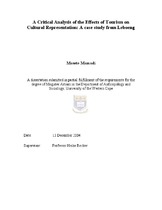| dc.contributor.advisor | Becker, Heike | |
| dc.contributor.author | Mamadi, Masete | |
| dc.contributor.other | | |
| dc.contributor.other | Faculty of Arts | |
| dc.date.accessioned | 2013-06-18T08:08:56Z | |
| dc.date.available | 2007/04/16 15:14 | |
| dc.date.available | 2007/04/16 | |
| dc.date.available | 2013-06-18T08:08:56Z | |
| dc.date.issued | 2004 | |
| dc.identifier.uri | http://hdl.handle.net/11394/1463 | |
| dc.description | Magister Artium - MA (Anthropology/Sociology) | en_US |
| dc.description.abstract | Cultural tourism is a vehicle for economic growth. Cultural representations are made in order to make the cultural tourism sector a more vibrant one. Given this argument, research in cultural tourism should take a critical stance in the analysis of cultural representations. An understanding of the meaning of culture is necessary to analyse the comparison of daily life with cultural representations. Observing the daily lives of host communities creates a conductive environment for realising and understanding the gaps between tourists experiences and the daily realities of the host communities. This research analysed how people represent their culture to tourists through the sale of crafts and dance performances. The research was carried out in Leboeng village, on the border between Mpumalanga and Limpopo provinces, near the small town of Ohrigstad. | en_US |
| dc.language.iso | en | en_US |
| dc.publisher | University of the Western Cape | en_US |
| dc.subject | Culture and tourism | en_US |
| dc.subject | South Africa | en_US |
| dc.subject | Mpumalanga | en_US |
| dc.subject | Tourism | en_US |
| dc.subject | Social aspects | en_US |
| dc.title | A critical analysis of the effects of tourism on cultural representation: a case study from Leboeng | en_US |
| dc.type | Thesis | en_US |
| dc.rights.holder | University of the Western Cape | en_US |
| dc.description.country | South Africa | |

